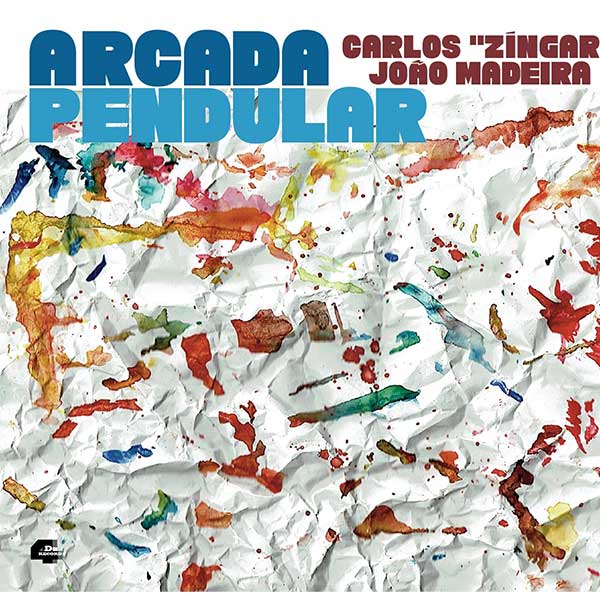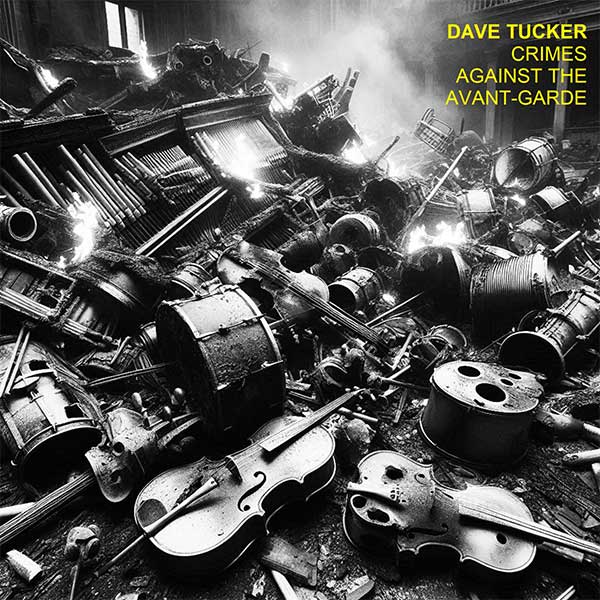
FUEL, Adam Fairhall / John Garner / Anton Hunter (John Garner)
Arcada Pendular, Carlos “Zingaro” / João Madeira (João Madeira)
Crimes Against the Avant-Garde, Dave Tucker (Scatter Archive)
Trained as he is across a range of musical cultures (classical, jazz, South Indian) John Garner is an interesting voice in the contemporary improvised music scene. On FUEL, as well as playing shakuhachi and tin whistle, he’s playing the sympolin, a string instrument specially made for him by instrument-maker David Bruce Johnson. It’s a kind of cross between a Hardanger fiddle and a viola d’amore. It features eight sympathetic strings, in addition to its main strings, which give it a distinctive, resonant sound. Pianist Adam Fairhall has spent the last fifteen years building an international reputation in jazz and improvisation. Here, he’s playing free bass accordion. Anton Hunter is a Manchester-based guitarist, improviser and composer. FUEL was recorded live earlier this year at The Noise Upstairs in Manchester.
Listening to it, you get the sense that these three performers are totally at ease with each other. Invention flows. And the instrumentation is very much on their side, making for both rich, homogenous textures and clearly differentiated contrapuntal ones. The accordion is a really versatile instrument in a free improv situation: it can provide rhythmic drive (through the bellows) and melodic interest as well as drone-like, sustained harmony. Fairhall exploits its potential to the full here. Hunter’s electronics provide a useful extension to his guitar work and, in Part 2, in conjunction with Fairhall’s accordion, an enchanting (not a word I use often) backdrop to Garner’s sympolin. Garner whips out a tin whistle for the last few minutes which, what with the presence of the guitar and accordion, has the effect of turning the music into – and I mean this in a good way – a kind of Cubist folk jam. It was a great way to end, I thought.

Carlos Zingaro is a Portuguese violinist and electronic musician. Classically trained in the 1950s and 1960s he has been a busy performer ever since and has appeared on over fifty recordings. He’s worked with Derek Bailey’s Company, Joëlle Léandre, Simon Fell, Mark Sanders and many others. He’s joined on Arcada Pendular (‘Pendulum Arcade’) by bassist João Madeira. Heavily involved in free improvisation since 2012, during the pandemic Madeira set up Quartet Exquis: ‘fascinated by the Surrealists, [he] derived the idea for this project as a musical equivalent of Cadavre Exquis. When the lock-down caused by Covid-19 ravaged the live music scene, he invited three musicians to join … with him to implement this experiment. All four of the quartet are experienced improvisers. … [They] began with each member making a solo recording, and then sending that in turn to each of the other three. Each player responded to the solos, without knowing the response of the other two, and then sent back their own individual track to … Madeira, who assembled the four pieces of music together’.
Arcada Pendular was – more conventionally – recorded in 2023 at the Convento da Madre de Deus da Verderena, Barreiro, Portugal. Unlike FUEL, with it’s suggestions of folk music, this is improvised music with its roots more in the classical avant-garde. Fragments of violin melody are broken by wide leaps and sul ponticello scribbles. Rhythms are so free as to be impossible to notate. (One of the great things about improvised music is the way it can undermine all the assumptions embedded in the classical tradition that limit the musical possibilities to the limitations of a notation system. The system evolved to serve the music, not to straitjacket it).
There are eleven tracks in all. Eleven wide-ranging conversations, all intense, rooted in the present moment and, as it should be, totally preoccupied with what’s going to happen next. I don’t know if they were recorded in the order they are presented, but the last builds up to a final dramatic gesture that underlined the feeling I had that this music is really quite special. It left me wanting to listen again from the beginning.

Dave Tucker began his musical career in the Manchester punk scene back in the 1970s. He was, for a while, a member of The Fall (he can be heard playing on their 1981 six-track 10”, Slates). Since then he’s been a regular performer and collaborator in the free improvised music world, as well as making music for TV. Crimes Against the Avant-Garde is the latest in a series of his albums to be released by Scatter Archive. (If you don’t know them, it’s worth going back through the Archive’s archive to check them out).
The end result is a far more engaging experience than the album notes would have you believe. In them, he says ‘I always try to record something every day, even if I am not that inspired, and have a full hard drive of noodlings which ended up on this release.’ (I was reminded of Joe Zawinul: I remember reading in one of his obituaries how, on his his death, he was found to have boxes full of audio cassettes containing endless keyboard noodles). There is a serious musical point to be made here: noodles might be pretty bland on their own, but it’s all about what you cook them with. Context is everything.
And I must say I warm to Tucker’s noodle recipes. There are five in all. Fluctuating, monolithic soundscapes that have something of an abstract expressionist feel to them. At times they feel like field recordings made on the streets of alien cities.
.
Dominic Rivron
LINKS
FUEL: https://johnjamesgarner.bandcamp.com/album/fuel
Arcada Pendular: https://joaomadeira.bandcamp.com/album/arcada-pendular
Crimes Against the Avant-Garde: https://scatterarchive.bandcamp.com/album/crimes-against-the-avant-garde
.
